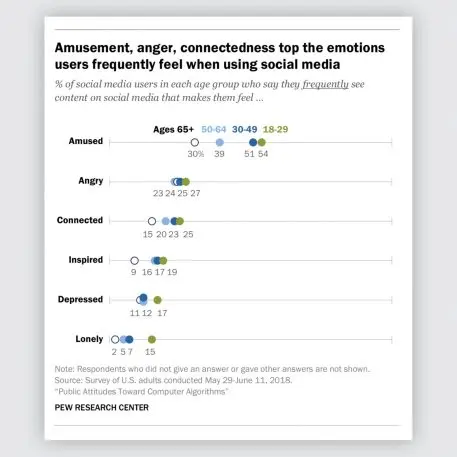Many Americans feel angry when they use social media–and even more are suspicious of the way algorithms are manipulating their experiences online.
That’s one way to read the results of a Pew Research Center project that investigated how Americans feel about algorithms in their lives. More than 4,000 people described how they feel about the many algorithms that make decisions in society today, including in the criminal justice system and consumer marketing. They also reported how social media makes them feel, providing a look at how social media platforms use algorithms on users’ feeds to drive engagement. For instance, 71% of respondents said that content on their social media feeds makes them angry; in fact, the top two most frequent emotions they report feeling are amusement and anger.

What does this have to do with design? Everything. Social media platforms are financially dependent on user engagement–they need your eyeballs to fulfill the impressions for which advertisers pay them. Algorithms are one way to drive up that engagement, by amplifying content that people engage with the most. Other ways include design nudges like reactions, which give platforms even more data about you and, in turn, helps them serve up the most engaging content.
We already know that anger and anxiety are reliable engagement drivers: In 2011, a study of 7,000 New York Times stories revealed that stories were 34% more likely to reach the publication’s “most-emailed” list if they evoked anger. A more recent study of more than half a million tweets found that the average tweet was 20% more viral if it included a moral or emotionally resonant word like “evil” or “shame.” Anger sells; any good, engagement-seeking algorithm will boost it, and any engagement-seeking designer will make it easy to share and engage with.
But it turns out that users are overwhelmingly aware and suspicious of how problematic algorithms can be, Pew’s researchers explain:
Roughly eight-in-ten social media users think it is unacceptable for these platforms to do things like remind some users but not others to vote on election day (82%), or to show some users more of their friends’ happy posts and fewer of their sad posts (78%). And even the standard A/B testing that most platforms engage in on a continuous basis is viewed with much suspicion by users: 78% of users think it is unacceptable for social platforms to change the look and feel of their site for some users but not others.
When it comes to how algorithms are used elsewhere in society, such as in politics or law, many people are concerned about bias and unfairness–but that concern fluctuates based on context. For instance, only 30% of people think it’s okay for companies to offer deals and discounts based on an algorithmic assessment of each customer’s personal and behavioral data. Shockingly, about 50% are okay with criminal justice systems using algorithms to predict whether a parolee will commit another crime–a practice that has been shown to be deeply flawed and racially biased.
Finally, three quarters of people think what they see on their feeds isn’t representative of society. People know that the picture social media algorithms paint isn’t an accurate portrayal of the real world. That seems not to stop us from feeling angry about it.
Recognize your brand’s excellence by applying to this year’s Brands That Matter Awards before the early-rate deadline, May 3.
